American
Whiskey:
ISAIAH MORGAN
DISTILLERY, Kirkwood Winery
Isaiah Morgan
Rye Whiskey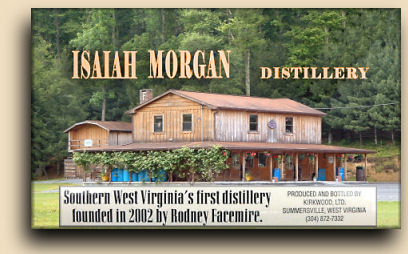
Southern Moon Corn Liquor
June, 2005
In the spectacular mountains of south-central West
Virginia, where eagles fly and the ghost of John Denver still hikes the
trails, lies the state's largest lake and the little town of Summersville, named
for it. A popular resort area in its own right, the town is also the northern
gateway to the New River area. And just north of town, tucked away in a lovely
little valley along Phillips Run is a clearing where Rodney Facemire has
operated the Kirkwood Winery at his home since 1992.
He produces over 4,000 gallons of wine annually, including more than 30
different varieties of French hybrids, American varietals, and fruit
wines.
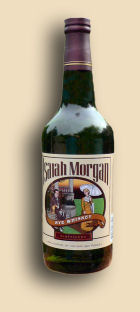 His winery offers tours to the public and is a well-known
attraction in this area.
His winery offers tours to the public and is a well-known
attraction in this area.
During a decade of making wines here, Rodney began experimenting with distilling. And, although he also makes grappa ( an unaged spirit made from grapes, which is to brandy what white dog is to bourbon and rye), being the fine West Virginian that he is, it shouldn't be too surprising to learn that his main product is whiskey.
But what might be surprising is the kind of whiskey Rodney makes, because it's just a little bit different from the corn whiskey you might associate with West Virginia.
You see, the Facemire family has their own history of distilling. But the
early Facemires (or Fesemeyers, Fesmeiers, Fessmeyers, Fitzmires,
Fosmires, or whatever) were not corn farmers. The family, which descended
from Johnnes Facemire, who arrived in Philadelphia on October 20,
1752 from Wuerttemberg, Germany, located in the same Palatinate area from
which emigrated the Boehms (as in Jim Beam bourbon) and the Oberholtzers
(Old Overholt rye). Somewhere in the family tree occurred a distiller of
rye whiskey known as Isaiah Morgan.
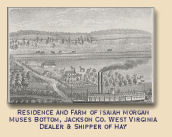 So,
perhaps it should come as no surprise that when Rodney decided to throw
himself upon the imposing wall of laws meant to discourage new whiskey
producers, it was in order to distill and bottle a very different kind of
white whiskey... Isaiah Morgan fresh rye.
So,
perhaps it should come as no surprise that when Rodney decided to throw
himself upon the imposing wall of laws meant to discourage new whiskey
producers, it was in order to distill and bottle a very different kind of
white whiskey... Isaiah Morgan fresh rye.
Rye whiskey, and the heritage of the Palatinate Germans who
once made it, goes
to the very core of American whiskey. We have much more to say about its
early history in our travels through
Western Pennsylvania. Facemire's operation is very similar, both in
capacity and in appearance, to George Shreve's distillery in Perryopolis, Pennsylvania, built over
210 years earlier. Of course there are some improvements that have
occurred over the years; this is, after all, a modern distillery, despite
being a very small one.
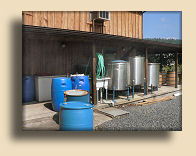 Rodney
has operated the
Kirkwood Farms Winery here for many years, and he has
accumulated an abundance of fermenting equipment designed for small winery
production. Blue poly barrels are everywhere along the wraparound porch
and under an arbor in back with the farm equipment. Some have fermentation
locks protruding, others are sealed up. Most of these are probably filled
with wine, but he uses the same kind in the distillery as well.
Rodney
has operated the
Kirkwood Farms Winery here for many years, and he has
accumulated an abundance of fermenting equipment designed for small winery
production. Blue poly barrels are everywhere along the wraparound porch
and under an arbor in back with the farm equipment. Some have fermentation
locks protruding, others are sealed up. Most of these are probably filled
with wine, but he uses the same kind in the distillery as well.

The Isaiah Morgan still itself is very small, probably no bigger than the one displayed at George Shreve's, but Rodney Facemire has designed a system that allows it to run continuously, like a column still, instead of in small, discrete batches, like other pot stills.
Whiskey at Isaiah Morgan is distilled from just the liquid wash, not from a mash containing solids. The mash is fermented in a row of about seven blue barrels, and when the fermentation is completed, the liquid is separated from the solids and siphoned into another row of blue barrels sitting on a shelf just above them. Each of these barrels connects to a common PVC pipe that leads directly to the gleaming stainless steel still. Since the still's capacity is just about that of one blue barrel, Rodney can, by opening and closing easily reachable valves, direct the contents of any one barrel to the still, while simultaneously filling the previously-spent barrel with freshly-fermented wash from its fermenter below.
Unfortunately, Rodney is away today so we aren't able to
meet and talk with him, but we are taken around by his assistant, Jesse,
who seems to know about all there is to know about the operation, from
mashing to bottling. Jesse shows us a row of 1st-use charred oak barrels
that hold rye whiskey that will become legal straight rye after four
years. When
asked whether the current, raw product would be discontinued then, he
didn't seem to think so.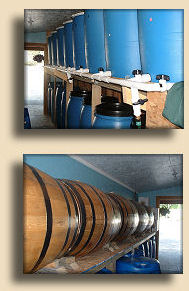
Right now, says Jesse, the big news at Isaiah Morgan is the West Virginia State Senate's passing of SB234 (a PDF file) this week. The new law creates an additional legal class of alcohol distillers, designated "mini-distillery", which are defined as establishments "where, in any year, twenty thousand gallons or less of alcoholic liquor is manufactured with no less than twenty-five percent of raw products being produced by the owner of the mini-distillery on the premises of that establishment, and no more than twenty-five percent of raw products originating from any source outside this state". And having defined this new class, the law then grants mini-distilleries permission to allow on-site tasting and on-site retail sales of the liquor they produce. It also allows the mini-distillery to advertise off-site. The senate bill was introduced in February (2005) by Senators Shirley Love and Gil White, and Rodney Facemire, who is involved in several civic organizations and is an important figure in Summerville and Nicholas County, has worked hard campaigning for its passage, as well as for the House Bill HB2522 that preceded it.
It's not hard to see why this legislation is so important to Facemire -- Isaiah Morgan is one of only two licensed distilleries in the state, mini- or otherwise, the other being Payton Fireman's West Virginia Distilling Company in Morgantown. Both produce well under the 20,000 gallon qualification limit, and the new law opens up a world of potential business for Isaiah Morgan and...
... and that's where it gets a bit more interesting. Because somewhere along the road to becoming law, the definition of "mini-distillery" acquired a second requirement, the one that excludes distillers using "more than twenty-five percent of raw products originating from any source outside this state". The Bill itself offers no rationale for that clause, and under the circumstances there wouldn't seem to be a reason to insert it into the definition. Except that, since eighty percent of West Virginia Distilling Co.'s Mountain Moonshine is made with grain neutral spirits -- which are not produced in West Virginia -- the law effectively disqualifies Isaiah Morgan's only licensed competitor. We would have enjoyed an opportunity to discuss these issues with Rodney, and John says we'll almost certainly get a chance to on our next visit.
Isaiah Morgan Rye Whiskey isn't the only spirit Rodney
distills. In addition to that and the grappa mentioned before, he also makes
Southern Moon, an unaged white corn liquor targeted at a particular niche
of drinkers who would like to experience "moonshine whiskey" legally and
without the dangers associated with obtaining real contraband.
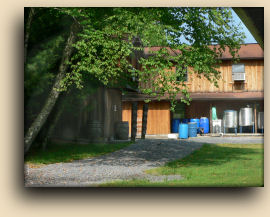 In that
respect, he is similar to Payton Fireman and Chuck Miller and even some commercial
distillers who bottle corn whiskey, while at the same time his product is as
different from any of those as they are from one another.
In that
respect, he is similar to Payton Fireman and Chuck Miller and even some commercial
distillers who bottle corn whiskey, while at the same time his product is as
different from any of those as they are from one another.
While Payton Fireman's Mountain Moonshine is closely related to the rectified whiskies blended in the 19th century, it's really a quite modern spirit which is compounded from high-quality whiskey he makes using ingredients one would expect to see fine bourbon made from. It is then blended with flavorless neutral spirits to bring it down to a distinctive, but understated, product that appeals to more modern drinkers.
Chuck Miller's Virginia Lightning, on the other hand, is
down-on-the-farm pure corn whiskey. Chuck makes it in the tradition of the
pre-Prohibition corn farmer, transforming corn he grows himself into a
non-spoiling, easily transportable, value-added product.
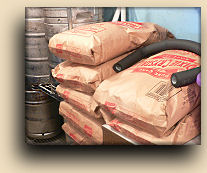 This
is the whiskey George Washington would have made and drank if he made corn
whiskey.
This
is the whiskey George Washington would have made and drank if he made corn
whiskey.
But he didn't. Washington's stills produced rye
whiskey, and that's what Rodney Facemire's unaged Isaiah Morgan Rye
Whiskey is like. Southern Moon, however, is about as close to real
bootleggers' white lightnin' as you can get from a state liquor store.
Although the proof is considerably lower -- and the quality considerably
higher --
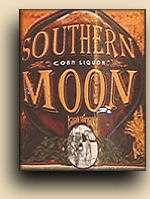 Southern Moon is made using a mixture of corn and good ol' Dixie Crystals
sugar. Which is why it can't use the word "Whiskey" to describe itself
(since by law the only ingredients allowed in a whiskey mash are grain,
yeast, and water).
It's label proudly states, "Southern Moon Corn Liquor". And it can
be justifiably proud; Southern Moon is a much higher-quality spirit than
most publicly-available moonshine, or even some commercial whiskeys, for
that matter. Remember that some of the finest connoisseur rums (at least the
agricole
variety) are also distilled from fermented sugar.
Southern Moon is made using a mixture of corn and good ol' Dixie Crystals
sugar. Which is why it can't use the word "Whiskey" to describe itself
(since by law the only ingredients allowed in a whiskey mash are grain,
yeast, and water).
It's label proudly states, "Southern Moon Corn Liquor". And it can
be justifiably proud; Southern Moon is a much higher-quality spirit than
most publicly-available moonshine, or even some commercial whiskeys, for
that matter. Remember that some of the finest connoisseur rums (at least the
agricole
variety) are also distilled from fermented sugar.
Southern Moon's flavor is different from the others', and worth trying. It is, after all, the closest of any of them to what "moonshine" really is. But Rodney's distillery isn't named the Southern Moon Distillery; it's the Isaiah Morgan Distillery. And as we look around at the buildings, the grounds, and the promotional items in the lovely gift shop, we can see that the focus on it's identity as Kirkwood Winery is also changing toward the distillery.
We're not sorry; we think there are more than enough little country wineries, already.
Way more.
So thank you, Rodney Facemire, for giving us a country distillery to visit.
|
We regret to report that Rodney Facemire passed away on April 25, 2006. Following is taken from the obituary which appeared in the April 27th edition of the Charleston [WV] Gazette:
His impact on today's
small-production craft and artisan distilling environment should be
forgotten. |
|
Lionel Rodney Facemire
Born May 7, 1941, in Charleston, he was the son of Jessie Butcher Facemire of Summersville and the late Foster Rodney Facemire. Funeral services will be conducted at 11
a.m. Friday, April 28, at Summersville Memorial United Methodist Church
with Pastor Damon Rhodes and the Rev. Nelson Harris officiating. Burial
with Masonic graveside rites will follow in Walker Memorial Park,
Summersville. |
![]()
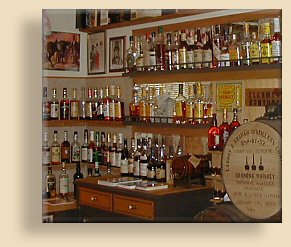 |
|
Story and original photography copyright © 2005 by Linda Lipman and John Lipman. All rights reserved. |
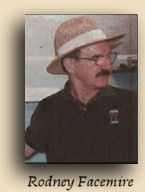 Lionel
Rodney Facemire, 64, of Summersville died Tuesday, April 25, 2006, in
Hubbard Hospice House, Charleston.
Lionel
Rodney Facemire, 64, of Summersville died Tuesday, April 25, 2006, in
Hubbard Hospice House, Charleston.

